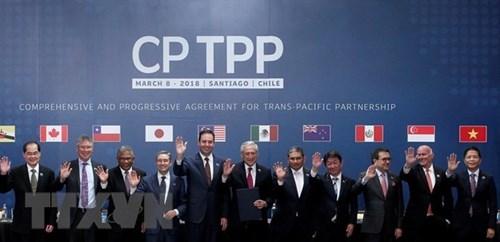March 15, 2018 | 22:54 (GMT+7)
Dong Nai firms supported to tap opportunities from FTAs
Authorities of the southern province of Dong Nai are making efforts to help local firms take full advantage of free trade agreements (FTAs).
The newly-signed Comprehensive and Progressive Agreement for Trans-Pacific Partnership (CPTPP) will take effect from 2019. It is hoped to create more opportunities for Vietnamese goods to access foreign markets.
However, enterprises in Dong Nai, especially small and-medium-sized enterprises (SMEs) have yet to build suitable development strategies to tap advantages from globalization.
    |
 |
|
Minister of Industry and Trade Tran Tuan Anh (R) and representatives from 10 member states of CPTPP at the signing ceremony of the deal |
According to Deputy Director of the provincial Department of Planning and Investment Pham Viet Phuong, local authorities need to roll out a specific roadmap to give sector-based support, thus tapping opportunities from FTAs.
Phuong said most domestic enterprises operating in Dong Nai do not have specific knowledge about the CPTPP or other FTAs.
Local authorities established a steering committee for economic development, which will focus on studying the CPTPP, thus devising strategies for groups of enterprises and sectors.
Meetings between experts and local enterprises will be arranged, helping firms get insights into trade barriers applied by the deal’s member countries, Phuong said.
Experts said that after the CPTPP is signed, Vietnam’s agriculture is forecast to be put at the greatest disadvantage because of its weak competitiveness, while the support industry has the biggest change to participate in global value chains.
If enterprises don’t have development strategies and fail to meet technical standards set by their partners, their products will not be competitive, they said.
Source: VNA